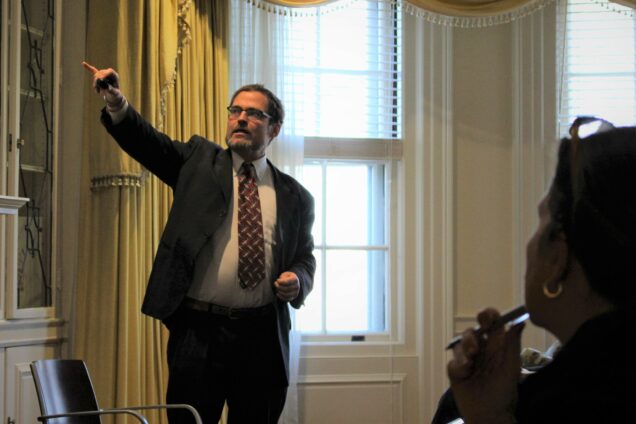Assessing and Planning for Neighborhood-Based Resiliency

On February 13th, Cambridge City Councilor Craig Kelley visited the Initiative on Cities to discuss his advice and experience with the Cambridge Mayor’s Special Committee on Neighborhood-Based Resilience. His seminar, moderated by BU City Planning and Urban Affairs Director and Associate Professor of the Practice Dr. Madhu Dutta-Koehler, explored his challenges when organizing within the community and tips for other cities looking to implement similar plans.
Kelley posed the question, “what is a resilient Cambridge?” Whether solar panels, ice ladders, or sufficient prescriptions to get through an emergency, the answers varied from the neighborhood to the policy level. Kelley emphasized that resiliency is an ongoing discussion with multiple ideas that are just as valid as his. At resiliency meetings, Kelley tries to bring in cross sections of ages, religions, and neighborhoods and constantly thinks about who isn’t part of the discussion.
“You’re existing inside someone else’s world… You need to figure out where you fit,” said Kelley.
Building resiliency must be a long term plan, which is difficult in a city with one-year budgets and two-year election cycles for city councilors. But Kelley reminded that there are no easy fixes, so take risks, forgive failure, and learn from mistakes. Policies must be intentional, focused, proactive, and inclusive, though should focus most on helping vulnerable populations.
Kelley noted the breadth of issues within neighborhood-based resiliency. In Cambridge, some issues are reflected on larger societal trends, such as housing, wealth distribution, or lack of social cohesion. But some are very local, such as flooding mitigation, fresh ponds, or electrical grid vulnerability.
“We have a 21st century economy that is strung on wooden poles,” said Kelley. “It’s a fragile system.”
In other cities, Kelley recommended appointing a Chief Resiliency Officer, though reminded the audience to keep a “bottom up” organization system led by the people. Kelley also emphasized building trust through neighborhood connections. In the times of an emergency, it’s often much faster to rely on neighbors than the government, he said. Regarding the Boston area’s contentious debate over space savers in parking spots, Kelley believed that the issue should be solved through neighborhood discussion, not a government policy.
“Building neighborhood resiliency is a never-ending process. This isn’t something you’re ever going to be done with,” said Kelley. “The world’s going to change and your resiliency challenges are going to change with it.”
Resiliency is often about a neighborhood’s ability to withstand the unexpected, from environmental changes to electric failures. Through inclusive discussions and social connections, Kelley emphasized the teamwork and willingness to try new ideas. To work in any neighborhood, resiliency must be focus on the long term and be led by the people.
But sometimes, for a resilient community, it can start with a cup of sugar.